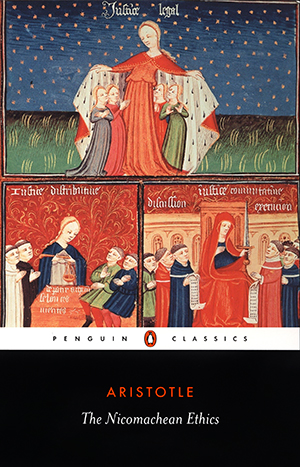
Title: The Nicomachean Ethics
Published by: Penguin Classics
Release Date: March 30, 2004
Contributors: Aristotle (Author), Hugh Tredennick J. A. K. Thomson (Translator), Jonathan Barnes (Introduction)
Genre: Classics
Pages: 400
ISBN13: 978-0140449495
Previously published as Ethics, Aristotle's The Nicomachean Ethics addresses the question of how to live well and originates the concept of cultivating a virtuous character as the basis of his ethical system. Here Aristotle sets out to examine the nature of happiness, and argues that happiness consists in 'activity of the soul in accordance with virtue', including moral virtues, such as courage, generosity and justice, and intellectual virtues, such as knowledge, wisdom and insight. The Ethics also discusses the nature of practical reasoning, the value and the objects of pleasure, the different forms of friendship, and the relationship between individual virtue, society and the State. Aristotle's work has had a profound and lasting influence on all subsequent Western thought about ethical matters.
This Penguin Classics edition is translated from the Greek by J.A.K. Thomson with revisions and notes by Hugh Tredennick, and an introduction and bibliography by Jonathan Barnes.
Aristotle was born in 384BC. For twenty years he studied at Athens at the Academy of Plato, on whose death in 347 he left, and some time later became tutor to Alexander the Great. On Alexander's succession to the throne of Macedonia in 336, Aristotle returned to Athens and established his school and research institute, the Lyceum. After Alexander's death he was driven out of Athens and fled to Chalcis in Euboea where he died in 322. His writings profoundly affected the whole course of ancient and medieval philosophy.












Comments are closed.